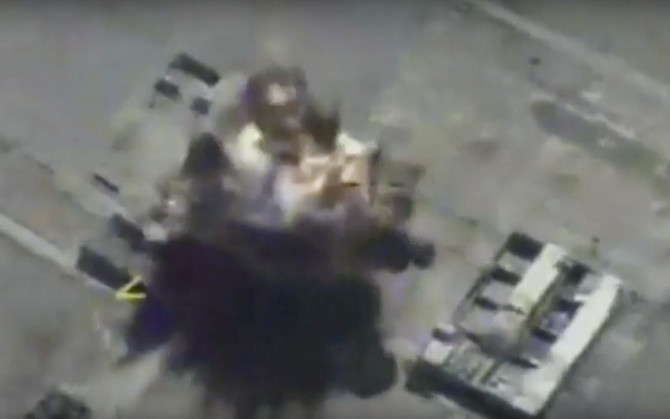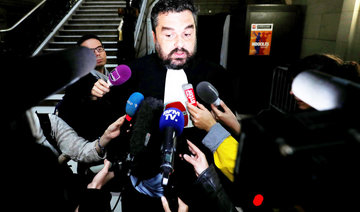BEIRUT, Syria: Regime forces Friday broke into the eastern town of Mayadeen, one of the Daesh group’s last bastions in Syria, backed by Russian air raids taking a deadly toll on civilians.
Mayadeen in the oil-rich eastern province of Deir Ezzor is seen as the jihadist group’s “security and military capital” in Syria, and its loss would deal “a severe blow” to the jihadists, according to a Syrian military source.
Over the course of months of successive defeats, Mayadeen and nearby Albu Kamal on the Iraqi border have taken in Daesh fighters fleeing the battle to the north for Raqqa city in the face of an offensive launched by US-backed Kurdish and Arab forces.
“With support from Russian aviation, regime forces entered Mayadeen and took control of several buildings in the west of the town,” Rami Abdel Rahman, head of the Britain-based Syrian Observatory for Human Rights, told AFP.
Mayadeen, which the jihadists have controlled since 2014, sits on the western bank of the Euphrates River, between provincial capital Deir Ezzor, where the jihadists still hold several districts, and the border with Iraq.
Daesh remains in control of half of Deir Ezzor province, despite advances by President Bashar Assad’s forces and a separate offensive against the jihadists by the Kurdish-Arab alliance.
The Observatory said the target of the regime advance was to recapture the Al-Omar oilfield held by Daesh to the northeast of Mayadeen that was destroyed in US-led coalition air strikes in 2015.
The jihadists had been drawing oil sale revenues from the field of between $1.7 million and $5.1 million a month, according to the coalition.
On another front, regime forces said Friday they had ended their military operations in the east of central province of Homs, after “eliminating the last groups” of Daesh fighters from an area of 1,800 square kilometers, the official Sana news agency reported.
The advances against Daesh in Deir Ezzor have cost a heavy civilian death toll from Russian and coalition air raids.
The Observatory said Russian air strikes on Thursday night killed 14 people, including three children, fleeing across the Euphrates on rafts near Mayadeen.
Moscow has been carrying out relentless air strikes in support of its ally Damascus targeting both Daesh in Deir Ezzor province and rival jihadists led by Al-Qaeda’s former Syria affiliate in Idlib province in the northwest.
Daesh has seen its self-declared “caliphate” straddling Syria and Iraq shrink steadily over the past two years and has lost all but a few of its main hubs in both Arab states.
On Wednesday, another Russian air strike killed 38 civilians trying to flee the fighting in Deir Ezzor province, according to the Observatory.
The Observatory relies on a network of sources inside Syria, and says it determines whose planes carry out raids according to type, location, flight patterns and munitions used.
It has reported hundreds of civilians killed in anti-Daesh operations in Deir Ezzor and Raqqa. On Tuesday, it said a US-led coalition strike in Raqqa killed at least 18 civilians.
Russia has not acknowledged any civilian deaths from its strikes since it intervened in Syria in 2015, and dismisses the Observatory’s reporting as biased.
On Thursday, the Red Cross said Syria was experiencing its worst levels of violence since the battle for the country’s second city Aleppo late last year.
“For the past two weeks, we have seen an increasingly worrying spike in military operations that correlates with high levels of civilian casualties,” said Marianne Gasser, the head of the International Committee of the Red Cross delegation in Syria.
Syria regime enters Mayadeen in ‘severe blow’ to Daesh
Syria regime enters Mayadeen in ‘severe blow’ to Daesh

Syria authorities say torched 1 million captagon pills

DAMASCUS: Syria’s new authorities torched a large stockpile of drugs on Wednesday, two security officials told AFP, including one million pills of captagon, whose industrial-scale production flourished under ousted president Bashar Assad.
Captagon is a banned amphetamine-like stimulant that became Syria’s largest export during the country’s more than 13-year civil war, effectively turning it into a narco state under Assad.
“We found a large quantity of captagon, around one million pills,” said a balaclava-wearing member of the security forces, who asked to be identified only by his first name, Osama, and whose khaki uniform bore a “public security” patch.
An AFP journalist saw forces pour fuel over and set fire to a cache of cannabis, the painkiller tramadol, and around 50 bags of pink and yellow captagon pills in a security compound formerly belonging to Assad’s forces in the capital’s Kafr Sousa district.
Captagon has flooded the black market across the region in recent years, with oil-rich Saudi Arabia a major destination.
“The security forces of the new government discovered a drug warehouse as they were inspecting the security quarter,” said another member of the security forces, who identified himself as Hamza.
Authorities destroyed the stocks of alcohol, cannabis, captagon and hashish in order to “protect Syrian society” and “cut off smuggling routes used by Assad family businesses,” he added.
Syria’s new Islamist rulers have yet to spell out their policy on alcohol, which has long been widely available in the country.
Since an Islamist-led rebel alliance toppled Assad on December 8 after a lightning offensive, Syria’s new authorities have said massive quantities of captagon have been found in former government sites around the country, including security branches.
AFP journalists in Syria have seen fighters from Islamist group Hayat Tahrir Al-Sham (HTS) set fire to what they said were stashes of captagon found at facilities once operated by Assad’s forces.
Security force member Hamza confirmed Wednesday that “this is not the first initiative of its kind — the security services, in a number of locations, have found other warehouses... and drug manufacturing sites and destroyed them in the appropriate manner.”
Maher Assad, a military commander and the brother of Bashar Assad, is widely accused of being the power behind the lucrative captagon trade.
Experts believe Syria’s former leader used the threat of drug-fueled unrest to put pressure on Arab governments.
A Saudi delegation met Syria’s new leader Ahmed Al-Sharaa in Damascus on Sunday, a source close to the government told AFP, to discuss the “Syria situation and captagon.”
Jordan in recent years has also cracked down on the smuggling of weapons and drugs including captagon along its 375-kilometer (230-mile) border with Syria.
Jordan says 18,000 Syrians returned home since Assad’s fall

AMMAN: About 18,000 Syrians have crossed into their country from Jordan since the government of Bashar Assad was toppled earlier this month, Jordanian authorities said on Thursday.
Interior Minister Mazen Al-Faraya told state TV channel Al-Mamlaka that “around 18,000 Syrians have returned to their country between the fall of the regime of Bashar Assad on December 8, 2024 until Thursday.”
He said the returnees included 2,300 refugees registered with the United Nations.
Amman says it has hosted about 1.3 million Syrians who fled their country since civil war broke out in 2011, with 650,000 formally registered with the United Nations.
Lebanon hopes for neighborly relations in first message to new Syria government

- Lebanon’s Iran-backed Hezbollah played a major part propping up Syria’s ousted President Bashar Assad through years of war
- Syria’s new Islamist de-facto leader Ahmed Al-Sharaa is seeking to establish relations with Arab and Western leaders
DUBAI: Lebanon said on Thursday it was looking forward to having the best neighborly relations with Syria, in its first official message to the new administration in Damascus.
Lebanese Foreign Minister Abdallah Bou Habib passed the message to his Syrian counterpart, Asaad Hassan Al-Shibani, in a phone call, the Lebanese Foreign Ministry said on X.
Lebanon’s Iran-backed Hezbollah played a major part propping up Syria’s ousted President Bashar Assad through years of war, before bringing its fighters back to Lebanon over the last year to fight in a bruising war with Israel – a redeployment which weakened Syrian government lines.
Under Assad, Hezbollah used Syria to bring in weapons and other military equipment from Iran, through Iraq and Syria and into Lebanon. But on Dec. 6, anti-Assad fighters seized the border with Iraq and cut off that route, and two days later, Islamist militants captured the capital Damascus.
Syria’s new Islamist de-facto leader Ahmed Al-Sharaa is seeking to establish relations with Arab and Western leaders after toppling Assad.
Iraqi intelligence chief discusses border security with new Syrian administration

BAGHDAD: An Iraqi delegation met with Syria’s new rulers in Damascus on Thursday, an Iraqi government spokesman said, the latest diplomatic outreach more than two weeks after the fall of Bashar Assad’s rule.
The delegation, led by Iraqi intelligence chief Hamid Al-Shatri, “met with the new Syrian administration,” government spokesman Bassem Al-Awadi told state media, adding that the parties discussed “the developments in the Syrian arena, and security and stability needs on the two countries’ shared border.”















